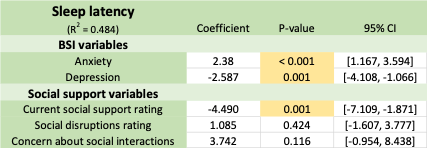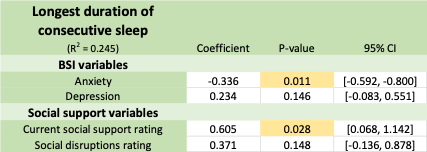Developmental and Behavioral Pediatrics: Other
Developmental and Behavioral Pediatrics 6
704 - Social support during the COVID-19 pandemic predicts infant sleep independent of perinatal mental health
Publication Number: 704.308

Anupama Balasubramanian, B.A. (she/her/hers)
Medical Student
Robert Larner, M.D., College of Medicine at the University of Vermont
South Burlington, Vermont, United States
Presenting Author(s)
Background:
Coronavirus (COVID-19)-related disruptions have been associated with psychological consequences for mothers, including anxiety and depression. Growing evidence suggests that perinatal mental health predicts infant sleep problems. And healthy sleep in this age range is important to neurodevelopment and growth. We investigate social support as a novel moderator of this relationship given COVID-19's substantial impact on social support.
Objective: 1. Characterize the nature of the association between maternal perinatal mental health and infant sleep during the COVID pandemic
2. Investigate the impact of social support on infant sleep after accounting for perinatal mental health symptomatology
Design/Methods:
84 perinatal women recruited into an ongoing cohort study between June 2020 and February 2021 completed surveys assessing social and environmental changes experienced during the COVID-19 pandemic. Measurements included perceptions of social support. Anxiety and depression were measured using the Brief Symptom Inventory and the Brief Infant Sleep Questionnaire quantified infant sleep patterns. Demographic adjusted stepwise linear regression models were used to investigate associations between perinatal anxiety and depression, perceived social support, and infant’s sleep.
Results:
Inclusion of perinatal anxiety and depression and social support variables resulted in the best fit model. Anxiety, depression, and ratings of current social support significantly predicted sleep latency time (Table 1). The mean reported latency time was 22.4 minutes (SD = 18.7 minutes).
Perinatal anxiety additionally predicts longest sleep period; the model once again improves upon introducing social support (Table 2). The mean longest sleep period was 8.6 hours (SD = 3.4 hours). Neither perinatal anxiety nor depression predicts nighttime wakings, duration of night wakings, or summative sleep duration.
Conclusion(s):
Average sleep duration was lower than previously reported norms for this age group (8.9 hrs) and sleep latency was consistent with documented norms. Our study replicates evidence of the relationship between perinatal mental health and infant sleep and suggests that perceived social support is an additional risk factor for disordered sleep. These data indicate efforts aimed at improving the social connectedness and mental health problems of families with infants born during the COVID pandemic may have a positive impact on infant sleep as well.

